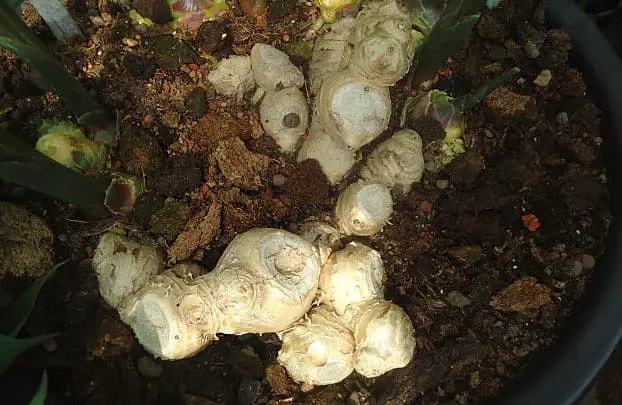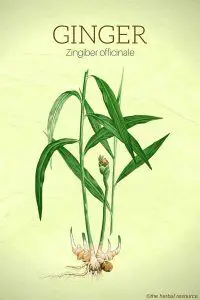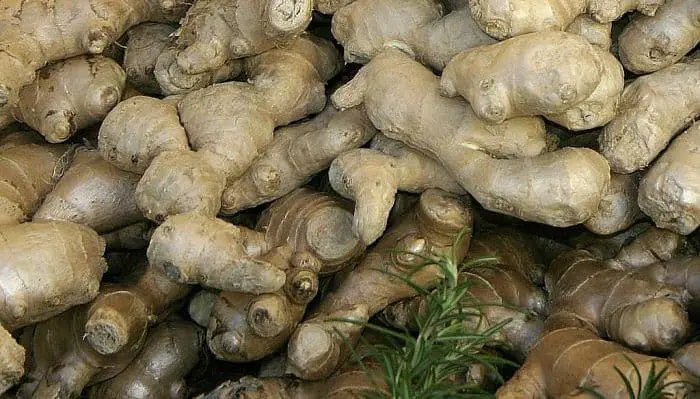Botanical Name: Zingiber officinale.
Other Common Names: Jamaican ginger, Indian Ginger, gan-jiang, sheng-jiang, African ginger, black ginger, zingiber officinale.
Description and Habitat: The ginger plant is an erect plant that grows from one to three feet tall.
It is a tropical plant found in East Asia and Australia. India and China are the largest suppliers of the herb used today. The large, scaly rhizome (underground stem) is the part of the plant used in herbal and medicinal use.
It is cultivated in most tropical and sub-tropical countries now, but its origin is unclear.
Plant Parts Used: The rhizome of the plant is used, both fresh and dried.

Therapeutic Uses, Benefits and Claims of Ginger Root
Ginger has been used for in cooking and traditional medicine for thousands of years. It is currently one of the most widely used herbs worldwide.
It has been used traditionally for a long time to treat nausea.
Scientific evidence confirms its uses as an herbal remedy for nausea and related ailments such as morning sickness and motion sickness.
Ginger contains many anti-fungal compounds which make it a popular herb for treating athlete’s foot.
Studies have shown that ginger root inhibits the production of cytokines, which promote inflammation. Therefore, the traditional Indian use for treating inflammation is gaining new-found popularity.
Some of the other traditional Asian uses for this herb include stimulating the appetite, promoting perspiration, and fighting body odor.
It has been used to treat pain and traditional Indian Ayurvedic medicinal uses include ginger root in herbal arthritis treatment.
Treatment of joint pain, especially those conditions caused by poor circulation, is another popular use of this herb.
Heart health is another benefit of ginger use. It has been shown to slow the production of LDL and triglycerides in the liver and prevent the clotting and aggregation of platelets in the blood vessels, associated with atherosclerosis and blood clots.
Ginger root has been used to treat common gastrointestinal complaints such as flatulence, indigestion and diarrhea. It has also been shown to lessen the severity of menstrual cramps.
The root has also been used to treat some of the symptoms of common cold and flu such as loosening phlegm and treating chills.
Cough, asthma, halitosis, high fever, sinusitis, menstrual cramps and colic have been treated traditionally with ginger.
It is a popular herbal remedy for heartburn.
Therapeutic Dosages
Ginger is available in fresh or dried root, tablets, capsules, powder, tincture, and tea forms.
Customary daily dosages are:
Fresh Ginger Root: 1/3 of an ounce of fresh ginger root daily. This can be taken in tea form or used in baking or other herbal uses. Take five to six thin slices of fresh ginger and steep it in hot water for thirty minutes to make a fresh ginger tea.
Dried Ginger Root: 150 to 300 milligrams of the dried root can be taken three times daily in capsule or powder form.
It may also be used to make tea. A teaspoonful of the dried powder may be added to a pint of hot water and steeped for 30 minutes to make the tea.
Tablets and capsules generally come in 150 mg to 500 mg doses.
Potential Side Effects of Ginger
Pregnant women should be careful with ginger due to its potential to cause uterine contractions.
It has also been shown to interfere with the absorption of dietary iron and fat-soluble vitamins.
Stomach upset is a common side effect with larger doses. It may potentiate the effects of blood thinners, barbiturates, beta-blockers, insulin, and other diabetes medications.
Due to the blood thinning effect, it should not be used before surgery.
Thordur Sturluson
Latest posts by Thordur Sturluson (see all)
- What is the Difference Between Hemp and Marijuana? - June 3, 2019


I swear by ginger.
I use it every other day.
Along with a myriad of other herbals, I used ginger to help cure me of Myalgic Encephalomyelitis.
A man-made illness with biowarfare origins. (my opinion) and is born out by the only UK study being held under the official secrets act. for the next 75 years.So something is slightly amiss isn’t it.
Anyway, I prepared an extensive array of herbs including a natural interferon (like chemo).
And now I am fabulous….well I’ve got heart damage from the long-term effects of the illness (oxidative stress and extreme viral infection) (inflammation). That’s what M.E does long term…..damages the left ventricle. You won’t get this info from a doc as they ain’t trained in the illness..anywhere on the planet…. it is against protocols….source DR Byron Hyde…One of a handful of enlightened beings. Anyway, where there is a will….herbals have put right what science put wrong.
I was looking for a way to preserve ginger like the candy ginger slices without the sugar?